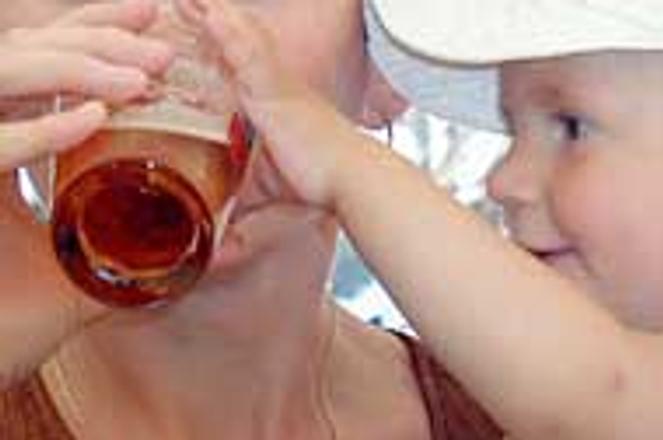BEER-loving Slovaks are already feeling a hangover from EU entry tax rules.photo: TASR
A MAN in his 40s in a Bratislava pub reacted angrily when asked how he felt about expected rises in beer and cigarette prices connected to Slovakia's drive to enter the European union.
"No comment. I don't even want to think about it," he said, sitting in front of a frothy pint and smoking a cheap 'Start' brand cigarette. "There's simply nothing to say."
Slovaks are among the world's most enthusiastic beer and tobacco consumers, but have found these commodities steadily more difficult to afford after a three-year decline in real wages of about seven per cent since the Dzurinda government took office in 1998.
Now, due to tax rates the EU requires of candidate countries, retail beer prices may rise by about five per cent a half-litre as of the new year, while the cost of a pack of cigarettes could rise six per cent.
While fewer Slovaks smoke than in other former Warsaw Pact countries like Hungary and Poland, few western countries have annual tobacco consumption higher than Slovakia's estimated 1,800 cigarettes per capita. Slovaks also drink an average of 90 litres of beer per capita every year, good for a top-10 global ranking.
These figures, say beer and tobacco producers, could be hurt by the coming price increases. The taxes are especially aggravating, they say, because so far they are only advised by a non-binding EU directive, and will not become law until the country joins the EU, expected in 2004.
"Slovakia is in tenth place in consumption of beer per capita in the world, and it would be a pity to lose this [status]. Slovakia is also one of the few countries that has not experienced a drop in beer consumption recently, but instead has seen slight growth over the last few years," said Roman Šusták, head of the Slovak Association of Beer Producers.
Brewers say they accept higher taxes in theory, but argue that the proposed levels are simply too high, and would put their most popular beer types at a disadvantage.
"The amount of taxes that we would have to pay would grow by Sk216 million, which is too much if you consider that the Slovak brewing sector is still in the red," said Šusták.
Beers in Slovakia face different tax levels according to their strength, which is measured on a scale of 'degrees' that was developed by Czech brewers and is used only in the Czech Republic and Slovakia.
The number of degrees a beer has indicate how much of the beer mixture before brewing was fermentable sugar. Beers of 10 degrees, with alcohol content around 3.5 per cent, remain the most popular, while premium 12 degree beer, around 5 per cent alcohol, is pub-standard.
At the moment, beers up to 11.5 degrees are taxed equally, but the new proposal calls for a progressive tax on beer of Sk32 per degree, per hectolitre - increasing the price of 10 and 11 degree beers by Sk1 to Sk1.5 per litre. Such beers now retail in supermarkets for Sk12-14.
The Finance Ministry argues that the proposed tax rate is in response to EU directives setting a minimum tax level of 0.75 euro per one degree [approximately Sk32].
Brewers, however, are calling for a lower tax rate as of 2003, saying that the EU rules need not be implemented until the country becomes a member of the union. Said Šusták: "This tax system puts the most popular beer type - 10 degrees - at a disadvantage. The new system raises its price too high. We suggest that the tax rate for one degree should be Sk28 [per hectolitre]."
Cigarette producers have also criticised the government's cigarette tax plan, saying the proposed rate would raise the price of a pack of cigarettes by Sk4 to Sk5.
If the proposal passes, cigarette tax would consist of a fixed duty of Sk0.35 per cigarette and a variable duty of 22 per cent of the price per pack from the beginning of 2003.
EU entry requires Slovakia to increase taxes on cigarettes from its current level of 32 per cent to the European-standard 57 per cent by 2009. However, EU requirements do not set a ratio between fixed and variable tax components.
The Slovak cigarette market now features a wider range in prices than found elsewhere in Europe thanks to so-called "short" cigarettes, which are only 70 mm long and considerably cheaper, due to lower taxes, than 80 mm king-size cigarettes.
However, according to Slovak International Tabak, the country's only cigarette producer, the emphasis on the fixed tax will erode the advantage of short cigarettes. Instead, the firm proposes, the variable tax value should be increased to maintain the wide price range among different brands and allow poorer consumers to continue to be able to afford to smoke.
SIT head Viktor Ma?oveík said: "The impact of this tax could be very dramatic if the government doesn't enable a system of taxation that provides a wide price range."
Both beer and cigarette tax proposals are in second reading in parliament, and could be passed in the June session.


